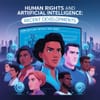The rapid advancement of artificial intelligence (AI) has sparked intense debate about its impact on human rights. As AI becomes increasingly embedded in various aspects of life, concerns about privacy, equality, freedom of expression, dignity, and accountability have taken center stage. The United Nations and other international organizations have sounded the alarm, warning that without strict limits, AI could become a tool for violating human rights on a massive scale.
The Human Rights Research Center (HRRC) has called for the immediate implementation of safeguards to govern AI globally, emphasizing that voluntary pledges are unreliable and that legally binding obligations are necessary to prevent AI from eroding human dignity and freedom. A coalition of scientists, policymakers, and Nobel laureates has joined forces to demand enforceable international limits on AI applications by 2026, highlighting the need for clearly defined "red lines" to prohibit the most dangerous uses of AI.
Privacy and Surveillance: AI-powered surveillance tools pose a significant threat to the fundamental human right to privacy. Real-time biometric surveillance in public spaces is considered fundamentally incompatible with human rights.
Accountability and Governance: There is a growing consensus that artificial intelligence must be harnessed in a way that respects and strengthens human rights, not undermines them. The European Union's Artificial Intelligence Act and the Council of Europe's Framework Convention on AI are notable efforts to establish global standards for rights-respecting AI governance.
The UN Working Group on Business and Human Rights has urged states to adopt legal and policy frameworks prohibiting AI uses incompatible with human rights, such as mass surveillance and predictive policing. Businesses must also undertake rigorous human rights due diligence, with clear mechanisms for grievance and accountability. As AI continues to evolve, it's essential to prioritize human rights, dignity, and democratic values to ensure that technology serves humanity, not the other way around.


